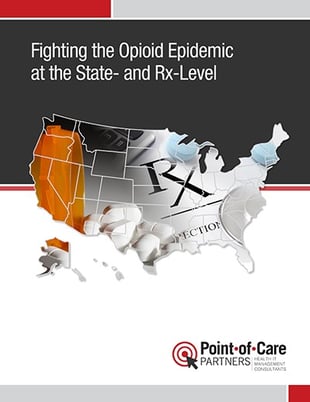By Keith Fisher, R.Ph. and Michelle Soble, R.Ph.
Co-Leads, POCP Regulatory Resource Center
 Opioid overdoses increased 30 percent from July 2016 through September 2017 in 52 areas in 45 states.¹ In response, state and federal regulators have passed a flurry of laws this year related to opioid prescribing. Point-of-Care Partners’ (POCP) Law Review staff has analyzed a wide array of new legislation and regulations, intended to fight the opioid crisis at both state and federal levels.
Opioid overdoses increased 30 percent from July 2016 through September 2017 in 52 areas in 45 states.¹ In response, state and federal regulators have passed a flurry of laws this year related to opioid prescribing. Point-of-Care Partners’ (POCP) Law Review staff has analyzed a wide array of new legislation and regulations, intended to fight the opioid crisis at both state and federal levels.
Most states have passed laws limiting opioid prescribing and a burgeoning number of states are placing additional requirements on prescribers, EHR vendors and pharmacies including:
- Limits on the amount of opioids that may be prescribed for acute pain
- Mandatory electronic prescribing for controlled substances (EPCS) for opioids and/or Schedule II drugs
- Mandatory electronic prescribing (ePrescribing) for all prescriptions
- Mandatory reviews of prescription drug monitoring programs (PDMPs) in advance of prescribing controlled substances
- Addition of ICD-10 codes on all prescriptions (written or electronic) for opioids or controlled substances
Fighting the opioid crisis will certainly continue to be top of mind for Federal lawmakers this fall, continuing the strong showing in the summer. In June, the House passed a sweeping package of 50 bills aimed at combatting the opioid crisis in various ways, including mandatory EPCS for Part D. However, the Senate is unlikely to address the proposed legislation until after the mid-term elections in November.
The nation’s largest payer, the Centers for Medicare and Medicaid Services (CMS), recently announced several new policies to combat opioid misuse by Medicare beneficiaries. These were provided in CMS's 2019 Final Call Letter, which requires Part D plan sponsors to implement various opioid-related safety measures. CMS also just released a final rule that requires the use of two new electronic prescribing (ePrescribing) measures for Schedule II controlled substances by hospitals and critical access hospitals. The Query of PDMP measure will be optional in CY 2019 but required beginning in CY 2020. The Verify Opioid Treatment Agreement will be optional for both CYs 2019 and 2020.
These limits and mandates have led to a decrease in opioid-related overdose deaths among the states and required use of PDMPs has resulted in a 98% reduction in doctor shopping in New York. Because these policies have been effective, the wave of similar legislation is expected to continue to additional states and mirrored at the federal level.
If you need more details about state legislation related to the opioid crisis, check out our report, “Fighting the Opioid Epidemic at the State- and Rx-Level,” which provides trends, maps and tables. POCP’s Regulatory Resource Center can help you stay on top of changing ePrescribing legislation through our Law Review and ePA Navigator Services. To learn more about the work of the Regulatory Resource Center visit our page. Or, drop us an email at regulatory@pocp.com if you’d like to learn more about how our regulatory products and expert consultation can be a value-add to your organization.




